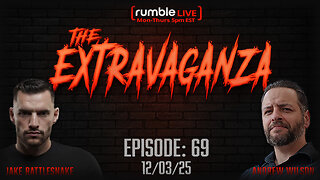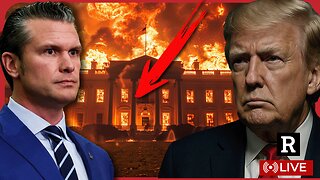Premium Only Content

Khan Koten: How He Saved the Kipchaks from the Mongol Horde. The Story of Cuman Survival.
Script:
"Betrayal and Hope: Köten's Gamble"
(Sound of wind whistling across the steppes, a low, resonant throat singing fades in and then under)
Hear now, the wind whispers tales across the endless plains, tales of the Kipchak, the Cuman, the people of the horse. Not an empire of stone and kings, but a realm woven from the strength of tribes, a tapestry of clans beneath the vast, indifferent sky. A constellation of leaders, each a star in their own right, their brilliance waxing and waning in the dance of power. Köten, ah, Köten, a name that echoes like thunder across the grasslands, a leader forged in the crucible of conflict, his authority not etched in marble, but earned in the clash of steel, in the shrewd weaving of alliances.
(Music shifts to a more rhythmic, percussive beat)
Picture them, the Kipchak, the Cuman, astride their magnificent steeds, masters of the bow, their lives a symphony of movement, following the rhythm of the seasons, their homes the felt tents that dotted the horizon like scattered stars. Pastoral nomads, they were, their wealth measured not in gold, but in the health of their herds, in the swiftness of their horses, in the loyalty of their kin. Their culture, a vibrant mosaic, threads woven from the traditions of many peoples who called the steppe home. A rich heritage, a testament to their adaptability, their resilience, their enduring spirit.
(Music becomes more melodic, with a hint of melancholy)
Their domain, a fluid expanse, a realm defined not by rigid borders, but by the reach of their influence, by the sway of their name. A vast territory, stretching from horizon to horizon, yet their grip was light, their control more akin to the wind shaping the sand dunes, ever shifting, ever changing. And then, a shadow fell across the steppe, a darkness spreading from the east, the rumble of hooves, the chilling cry of the Mongol horde.
(Music turns somber, with a low, mournful drone)
Köten, wise and far-seeing, he had felt the tremor of the earth, he had seen the storm gathering on the horizon. He knew the old ways were no match for this new terror. And so, he made a choice, a desperate gamble, a plea for survival. He led his people westward, seeking refuge in the land of the Hungarians, a pact sealed with promises and hope.
(Music becomes more intense, dramatic)
But fate, as it often does, played a cruel hand. Betrayal, a viper in the bosom of trust, struck Köten down. A senseless act, a tragedy born of fear and misunderstanding. His blood spilled on foreign soil, a sacrifice made in vain. The dream of sanctuary shattered, leaving his people scattered, adrift in a world consumed by chaos.
(Music softens, becomes more reflective)
Yet, even in tragedy, the Cuman spirit did not break. Though their leader was gone, their legacy lived on. They mingled with the Hungarians, their blood mingling with the Magyar, their language leaving its imprint on the tongue of their new home. They became part of the tapestry of Hungary, their strength, their resilience, their horsemanship, woven into the very fabric of the nation.
(Music swells, triumphant, then fades slowly back to the sound of wind)
Köten's story, a tale of courage and desperation, of hope and betrayal, is a reminder of the tumultuous times, the shifting sands of power, the challenges faced by those who lived on the edge of the world. He was a leader, a warrior, a visionary, a man who dared to make a difficult choice in the face of overwhelming odds. His name, and the name of his people, the Kipchak, the Cuman, will forever be etched in the chronicles of history, a testament to their enduring legacy, their indomitable spirit. Listen to the wind, and you will hear their whispers, carried on the breath of the steppe, a song of survival, a song of the Cuman.
-
 LIVE
LIVE
The Jimmy Dore Show
1 hour agoTrump Pardons DEMOCRAT Henry Cuellar! Candace SHUTS DOWN Zionist Talking Points! w/ Nick Cruse
9,030 watching -
 LIVE
LIVE
Glenn Greenwald
59 minutes agoTrump Administration Claims to Save Hundreds of Millions of Lives by Blowing Up Drug Boats; Ethan Klein's Unhinged Vengeance & Lawsuits Against Other YouTubers: With Taylor Lorenz | SYSTEM UPDATE #553
1,489 watching -

BonginoReport
2 hours agoWhite House Claps Back At Sabrina Carpenter - Nightly Scroll w/ Hayley Caronia (Ep.189)
28.5K8 -
 1:06:50
1:06:50
TheCrucible
3 hours agoThe Extravaganza! EP: 69 (12/03/25)
44.8K10 -
 1:08:49
1:08:49
Kim Iversen
2 hours agoEpstein Island: What's With The Creepy Medical Chair and Masks?
17.9K17 -
 23:54
23:54
Jasmin Laine
3 hours agoCarney’s WORST Day EVER—BOOED, Fact-Checked, and Forced to FLEE the House
4.64K7 -
 1:59:47
1:59:47
Redacted News
3 hours agoDeep State Coup Coming for Trump? New JFK Files Released and NATO Preparing Attack on Russia
134K58 -
 LIVE
LIVE
Dr Disrespect
8 hours ago🔴LIVE - DR DISRESPECT'S TRIPLE THREAT CHALLENGE - ARC RAIDERS • BF6 • FORTNITE
1,050 watching -
 1:00:57
1:00:57
Russell Brand
5 hours agoThe Vaccine Ideology Unmasked | Dr Peter McCullough - SF658
102K33 -
 1:11:25
1:11:25
vivafrei
4 hours agoKash Patel's Jacket-Gate! Pfizer Whistleblower Qui Tam on Appeal! Meanwhile in Canada! AND MORE!
54.4K39